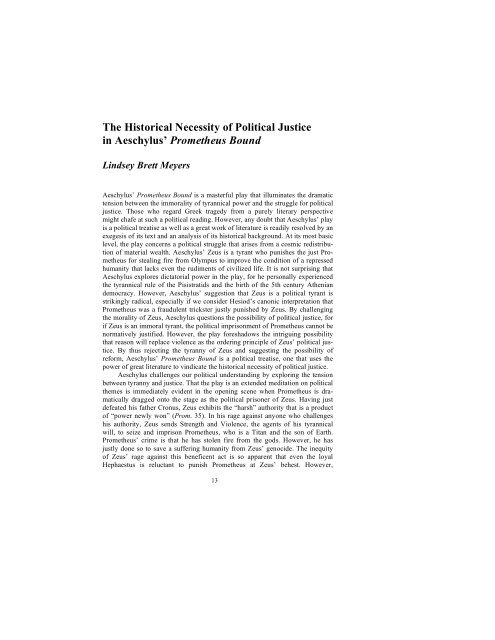Create successful ePaper yourself
Turn your PDF publications into a flip-book with our unique Google optimized e-Paper software.
The Historical Necessity of Political Justice<br />
in Aeschylus’ Prometheus Bound<br />
Lindsey Brett Meyers<br />
Aeschylus’ Prometheus Bound is a masterful play that illuminates the dramatic<br />
tension between the immorality of tyrannical power and the struggle for political<br />
justice. Those who regard Greek tragedy from a purely literary perspective<br />
might chafe at such a political reading. However, any doubt that Aeschylus’ play<br />
is a political treatise as well as a great work of literature is readily resolved by an<br />
exegesis of its text and an analysis of its historical background. At its most basic<br />
level, the play concerns a political struggle that arises from a cosmic redistribution<br />
of material wealth. Aeschylus’ Zeus is a tyrant who punishes the just Prometheus<br />
for stealing fire from Olympus to improve the condition of a repressed<br />
humanity that lacks even the rudiments of civilized life. It is not surprising that<br />
Aeschylus explores dictatorial power in the play, for he personally experienced<br />
the tyrannical rule of the Pisistratids and the birth of the 5th century Athenian<br />
democracy. However, Aeschylus’ suggestion that Zeus is a political tyrant is<br />
strikingly radical, especially if we consider Hesiod’s canonic interpretation that<br />
Prometheus was a fraudulent trickster justly punished by Zeus. By challenging<br />
the morality of Zeus, Aeschylus questions the possibility of political justice, for<br />
if Zeus is an immoral tyrant, the political imprisonment of Prometheus cannot be<br />
normatively justified. However, the play foreshadows the intriguing possibility<br />
that reason will replace violence as the ordering principle of Zeus’ political justice.<br />
By thus rejecting the tyranny of Zeus and suggesting the possibility of<br />
reform, Aeschylus’ Prometheus Bound is a political treatise, one that uses the<br />
power of great literature to vindicate the historical necessity of political justice.<br />
Aeschylus challenges our political understanding by exploring the tension<br />
between tyranny and justice. That the play is an extended meditation on political<br />
themes is immediately evident in the opening scene when Prometheus is dramatically<br />
dragged onto the stage as the political prisoner of Zeus. Having just<br />
defeated his father Cronus, Zeus exhibits the “harsh” authority that is a product<br />
of “power newly won” (Prom. 35). In his rage against anyone who challenges<br />
his authority, Zeus sends Strength and Violence, the agents of his tyrannical<br />
will, to seize and imprison Prometheus, who is a Titan and the son of Earth.<br />
Prometheus’ crime is that he has stolen fire from the gods. However, he has<br />
justly done so to save a suffering humanity from Zeus’ genocide. The inequity<br />
of Zeus’ rage against this beneficent act is so apparent that even the loyal<br />
Hephaestus is reluctant to punish Prometheus at Zeus’ behest. However,<br />
13

















